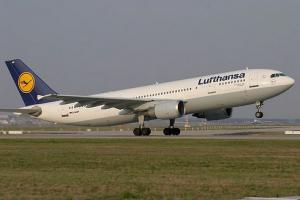Zika virusPlanes arriving from Zika-infected regions to be sprayed with insecticides
The U.K. government announced that planes landing in the United Kingdom from areas affected by the Zika virus will be sprayed with insecticide as part of the government’s response to the outbreak. So far there have been no Zika cases reported in the United Kingdom, but two adults in Ireland were confirmed to have been infected. Both have since fully recovered.

Next stop is pesticide spray // Source: commons.wikimedia.org
The U.K. government announced that planes landing in the United Kingdom from areas affected by the Zika virus will be sprayed with insecticide as part of the government’s response to the outbreak.
On Monday the World Health Organization (WHO) declared the Zika virus an international emergency.
The Daily Mail reports that so far there have been no Zika cases reported in the United Kingdom, but two adults in Ireland were confirmed to have been infected. Both have since fully recovered.
The government said earlier this week that as a precautionary measure, it was asking airlines to ensure that disinsection takes place on all flights travelling to the United Kingdom from countries with confirmed presence of Zika. Spraying insecticide inside the aircraft reduces the risk of passengers being bitten by any mosquitoes inside the plane.
Most airlines flying from Zika-infested area already spray their planes’ interiors with insecticides as a precaution against malaria, which is prevalent in the same regions where the Zika virus has been spreading.
The call by the U.K. government is consistent with advice from WHO Europe.
Medical experts note that the U.K. average temperature is lower than the typical temperature in Brazil and Colombia, the two countries most hardly hit by Zika, and the virus, which requires relatively high temperatures to breed and propagate, is thus extremely unlikely to be able to survive and breed in the United Kingdom.
The U.K. public health minister, Jane Ellison, said: “Disinsection is a highly precautionary measure to reduce the risk to passengers during flights to the U.K.. I want to reassure people that the risk to the UK population is extremely low. We advise people travelling to affected areas to reduce the risk of themselves being bitten by wearing mosquito repellent, long sleeves and trousers.
“Pregnant women should consider avoiding travel to countries with the Zika virus, or, if travel is unavoidable, they ought to seek travel health advice from their GP or a travel clinic well in advance of their trip.”
The British government has also said it would allocate further £1 million funds for research to tackle the Zika virus. The chief medical officer, Dame Sally Davies, said: “We are determined to support international efforts to understand how to diagnose the disease and control its spread. The UK is a world leader in medical research and I look forward to the progress this funding will undoubtedly bring. The risk to the UK from Zika virus is extremely low.”
